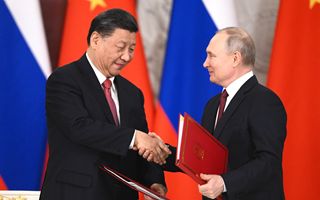(Finance) – “Moscow and Beijing will continue to strengthen trust and cooperation in the military sphere and expand the scope of military exercises and training.” This one joint statement signed in Beijing by Presidents Vladimir Putin and Xi Jinping, spread to the state only by the Kremlin. In detail, the two countries are ready to hold regular joint naval and air patrols, to strengthen coordination and cooperation at bilateral and multilateral levels, and to increase the potential and level of joint responses to challenges and threats. The declaration, which appears as a sort of “anti-US axis”, was signed yesterday on the occasion of the Putin’s state visit to China which will end today. For the Kremlin leader, it is the first mission abroad since taking office for his fifth mandate and the second to China in just over six months, after last October as special guest for the third Belt and Road forum Initiative (BRI), the New Silk Road launched by Xi in 2013.
During bilateral session lasted two and a half hours, the number 43 in just over 10 years, the two leaders placed the emphasis on economic and commercial ties: 240.1 billion dollars in record trade in 2023, 90% settled in yuan and rubles to the detriment of the dollar, to cover the passage of dual-use technology that is decisive for the Russian military machine. The two leaders announced their desire to deepen military and economic ties, reflecting a strategic partnership – strengthened by 11 inter-governmental agreements and an ad hoc declaration – aimed at challenging the US-led global order after “warm and comrades”, with Xi describing their friendship as “eternal” and a model of new international relations.
On the energy front, ties between Russia and China “will continue to grow”. Moscow said it was ready “to provide China with clean energy”. Opening the 2024 edition of the China-Russia Expo in Harbin, capital of Heilongjiang, Russian President Vladimir Putin said that “bilateral cooperation helps the economies of both countries”, welcoming all Chinese companies that want to invest in Russia. Moscow hopes for progress towards signing the “Power of Siberia 2” gas pipeline agreement which would double the supply of natural gas to the Dragon. Harbin, “little Moscow” due to its ties and historical buildings from the Russian past, is the second and final stop of the Kremlin leader’s state visit to China: also scheduled is a visit to the Harbin Institute of Technology, since 2020 on the US black list for links with the Chinese armed forces. “Putin’s visit to the Harbin Institute of Technology is a significant choice. He says two things: Sino-Russian solidarity against American sanctions and greater access to Chinese defense technology for the Russian arms industry,” he commented Mathieu Duchatel, political analyst at the Institut Montaigne.
Putin’s attention is focused on the issues of trade and the related possible support for the country engaged in its war against Ukraine. The head of the Kremlin is at the head of a substantial commercial delegation which includes Finance Minister Anton Siluanov and Central Bank Governor Elvira Nabiullina. Also present were executives of some of the largest Russian banks and energy companies, including Sberbank CEO German Gref, businessman Oleg Deripaska, VTB head Andrei Kostin, Rosneft number one Igor Sechin and the head by Novatek Leonid Mikhelson.
China’s economic and political support has been vital to Russia since the beginning of the war and Putin expressed gratitude for Beijing’s efforts. The two leaders agreed on the need to “find a political solution” and “to stop any step that contributes to the prolongation of hostilities and the further escalation of the conflict”. But the joint statement announced plans for expanded joint military maneuvers, while providing no details. Among the precedents, those in the Sea of Japan and the Gulf of Oman (with Iran), but the fear is that the cooperation will also reach the South China Sea, whose waters are agitated by tensions over Taiwan and by disputes between Beijing and Neighboring countries.
Xi, who cannot cut economic ties with the US and EU which absorb a combined trillion in exports made in China, said in the meeting with the media without questions that he “hopes that peace and stability will be quickly re-established on the European continent”. , ensuring “a constructive role”. Soon, however, the Chinese leader had to accept the new warning from the US State Department: “Beijing cannot have ties with Russia and the West, it cannot play at two tables”, warned the deputy speaker Vedant Patel.
Putin arrived in Beijing with a large delegation and the new Defense Minister Andrei Belousov, economist with strong ties to the mandarin leaders. He is the key figure for solutions useful for encrypting transactions and shipments of prohibited “dual use” goods, which have increasingly come under the radar of the United States.
